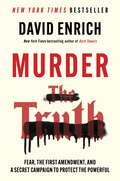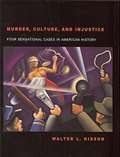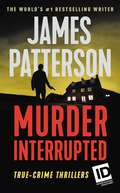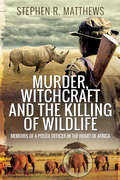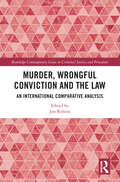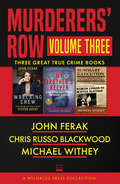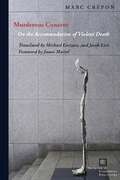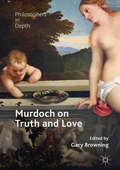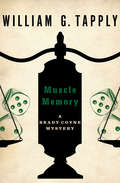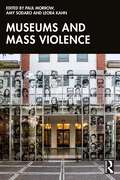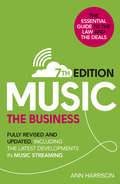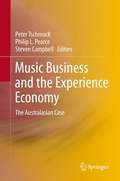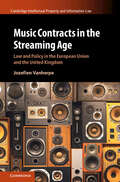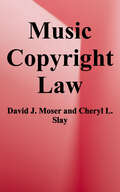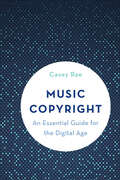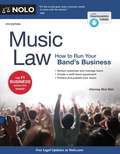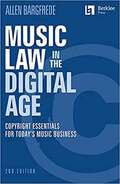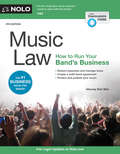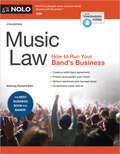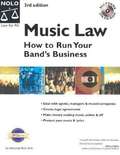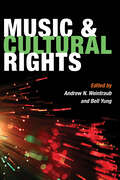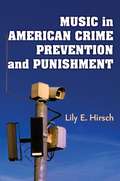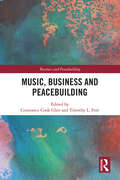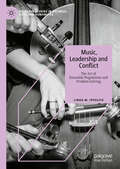- Table View
- List View
Murder the Truth: Fear, the First Amendment, and a Secret Campaign to Protect the Powerful
by David Enrich"Authoritarian governments abroad have long used legal threats and lawsuits against journalists to cover up their disinformation, corruption, and violence. Now, as master investigative journalist David Enrich reveals, those tactics have arrived in America.” — Ruth Ben-Ghiat, author of Strongmen. <p> David Enrich, the New York Times Business Investigations Editor and the #1 bestselling author of Dark Towers, produces his most consequential and far-reaching investigation yet: an in-depth exposé of the broad campaign—orchestrated by elite Americans—to silence dissent and protect the powerful. <p> It was a quiet way to announce a revolution: In an obscure 2019 case that the Supreme Court refused to even hear, Justice Clarence Thomas raised the prospect of overturning the legendary New York Times v. Sullivan decision. Though hardly a household name, Sullivan is one of the most consequential free speech decisions, ever. Fundamental to the creation of the modern media as we know it, it has enabled journalists and writers all over the country—from top national publications to revered local newspapers to independent bloggers—to pursue the truth aggressively and hold the wealthy, powerful, and corrupt to account. <p> Thomas’s words were a warning—the public awakening of an idea that had been fomenting on the conservative fringe for years. Now it is going mainstream. From the Florida statehouse to small town New Hampshire to Donald Trump's White House, this movement today consists of some of the world’s richest and most powerful people and companies, who believe they should be above scrutiny and want to silence or delegitimize voices that challenge their supremacy. Indeed, many of the same businessmen, politicians, lawyers, and activists are already weaponizing the legal system to intimidate and punish journalists and others who dare criticize them. <p> In this masterwork of investigative reporting, David Enrich, New York Times Business Investigations Editor, traces the roots and reach of this growing threat to our modern democracy. With Trump’s emboldened right-wing coalition committed to demonizing and punishing those who attempt to hold them accountable, Murder the Truth sounds the alarm about the looming war over facts, laying bare the stakes of losing our most sacrosanct rights. The result is a story about power in the age of Trump—the way it’s used by those who have it and the lengths to which they will go to avoid it being questioned. <b>New York Times Bestseller</b>
Murder, Culture, and Injustice: Four Sensational Cases in American History
by Walter L. HixsonPresents an account of four sensational national murder cases 'the Lizzie Borden murders, the Lindbergh baby case, the Sam Sheppard case, and the O J Simpson case'. This title offers observations into the greater cultural and political forces that shaped their verdicts, with step-by-step analysis of the details of each case.
Murder, Interrupted: True-crime Thrillers (James Patterson's Murder is Forever #1)
by James PattersonTwo true-crime thrillers as seen on Discovery's Murder is Forever TV series - premiering January 2018MURDER, INTERRUPTED. Rich, cheating financier Frank Howard wants his wife dead, and he's willing to pay Billie Earl Johnson whatever it takes, to the tune of $750,000. When his bullet misses the mark, Billie Earl and Frank will turn on each other in a fight for their lives . . . MOTHER OF ALL MURDERS. Dee Dee Blancharde is a local celebrity. Television reports praise her as a single mother who tirelessly cares for her wheelchair-bound, chronically ill daughter. But when the teenaged Gypsy Rose realizes she isn't actually sick and Dee Dee has lied all these years, Gypsy Rose exacts her revenge . . .
Murder, Witchcraft and the Killing of Wildlife: Memoirs of a Police Officer in the Heart of Africa
by Stephen R. MatthewsA former British police officer’s memoir of his assignment in Northern Rhodesia where he encountered black magic, cannibals, human trafficking, and more.Stephen R. Matthew’s first police posting near the Northern Rhodesian border with the Congo coincided dramatically with a time of horrific ethnic cleansing in the Belgian Congo area. At just twenty-one years old, Stephen was knifed, ambushed, stoned, shot, and wounded by bow and arrow. Steve’s life was saved several times by his courageous Doberman, Alex . . . This is the true, action-packed, unadulterated stories of those frantic and dangerous years, where a young police inspector confronted terrifying actions and events well beyond his complete understanding. He found that the cops were fighting on two fronts: trying to protect the vulnerable citizens of the country and at the same time endeavoring to stop the slaughter of wildlife.This unique book depicts dramatic accounts of witchcraft-murders and cannibalism. Highly dangerous solo investigations are detailed, incorporating incidents of black magic, kidnapping, arson, gun-running and people trafficking.“[A] rattling good memoir by a former British police officer writing of his colorful career while on assignment in Congo . . . . Despite his best attempts, Matthews could never shake off the way the locals saw him, as a white witch doctor with the ability to speak with the spirits of the dead and place spells against the living. There’s a story—several, in fact—about what led to this perception, which proves that, at the very least, the author learned a thing or two about telling a tale.” —The New York Times
Murder, Wrongful Conviction and the Law: An International Comparative Analysis (Routledge Contemporary Issues in Criminal Justice and Procedure)
by Jon RobinsThis collection brings together international experts to present a comparative analysis of wrongful conviction and criminal procedure. The volume takes an interdisciplinary approach with authors drawn from a broad range of backgrounds including law, psychology, forensics and journalism. All are experts in their field with direct experience of the investigation of wrongful conviction in their own countries. Focusing on the main areas of concern in their own jurisdiction, each author discusses common themes, including: the extent of the problem; the types of cases that feature in miscarriages of justice; the legal mechanism for the correction of a wrongful conviction; compensation for the wrongly convicted; public awareness and concern about the issue generally and in light of highprofile cases; and the extent to which wrongful conviction has driven criminal justice reform. The book will be essential reading for students, researchers and policy-makers interested in comparative law, criminology and psychology.
Murderers' Row Volume Three: Wrecking Crew, My Brother's Keeper, Summary Execution (Murderers' Row #3)
by Michael Withey John Ferak Chris Russo BlackwoodThree bestselling true crime books for the price of one—from the Steven Avery case to a brother&’s quest for justice to an international conspiracy. Wrecking Crew: While working for USA Today&’s Investigative Team, John Ferak wrote dozens of articles on Steven Avery, who was charged with the murder of Teresa Halbach. In Wrecking Crew, Ferak lays out high-profile lawyer Kathleen Zellner&’s post-conviction strategy to free Avery. &“Whatever you thought you believed about this infamous case, get ready to change your mind or be more convinced than ever . . . Fascinating.&” —Steve Jackson, New York Times bestselling author My Brother&’s Keeper: The moment he found out his brother Gary was missing and presumed dead, Ted Kergan launched a relentless effort to bring two suspected killers to justice and find Gary&’s body. Little did he know his quest would consume a fortune and take thirty years to reach its dramatic conclusion. An International Book Awards Finalist! &“A thirty-year search for the truth . . . a story of persistence, determination, and deep brotherly love.&” —Denise Wallace, author of Daddy&’s Little Secret Summary Execution: On June 1, 1981, two young activists, Silme Domingo and Gene Viernes, were murdered in Seattle in what was made to appear like a gang slaying. But the victims&’ families and friends suspected they were considered a threat to Philippines dictator Ferdinand Marcos and his regime&’s relationship to the United States. &“Remarkable . . . The story has so many twists—as well as amazing turns—that prove the point that conspiracy theories aren&’t necessarily fiction.&” —Eric Nalder, Pulitzer Prize–winning investigative journalist
Murdering Animals: Writings On Theriocide, Homicide And Nonspeciesist Criminology (Palgrave Studies In Green Criminology Ser.)
by Piers BeirneMurdering Animals confronts the speciesism underlying the disparate social censures of homicide and “theriocide” (the killing of animals by humans), and as such, is a plea to take animal rights seriously. Its substantive topics include the criminal prosecution and execution of justiciable animals in early modern Europe; images of hunters put on trial by their prey in the upside-down world of the Dutch Golden Age; the artist William Hogarth’s patriotic depictions of animals in 18th Century London; and the playwright J.M. Synge’s representation of parricide in fin de siècle Ireland. Combining insights from intellectual history, the history of the fine and performing arts, and what is known about today’s invisibilised sites of animal killing, Murdering Animals inevitably asks: should theriocide be considered murder? With its strong multi- and interdisciplinary approach, this work of collaboration will appeal to scholars of social and species justice in animal studies, criminology, sociology and law.
Murderous Consent: On the Accommodation of Violent Death (Perspectives in Continental Philosophy)
by Marc CréponWinner, 2002 French Translation Prize for NonfictionMurderous Consent details our implication in violence we do not directly inflict but in which we are structurally complicit: famines, civil wars, political repression in far-away places, and war, as it’s classically understood. Marc Crépon insists on a bond between ethics and politics and attributes violence to our treatment of the two as separate spheres. We repeatedly resist the call to responsibility, as expressed by the appeal—by peoples across the world—for the care and attention that their vulnerability enjoins. But Crépon argues that this resistance is not ineluctable, and the book searches for ways that enable us to mitigate it, through rebellion, kindness, irony, critique, and shame. In the process, he engages with a range of writers, from Camus, Sartre, and Freud, to Stefan Zweig and Karl Kraus, to Kenzaburo Oe, Emmanuel Levinas and Judith Butler. The resulting exchange between philosophy and literature enables Crépon to delineate the contours of a possible/impossible ethicosmopolitics—an ethicosmopolitics to come.Pushing against the limits of liberal rationalism, Crépon calls for a more radical understanding of interpersonal responsibility. Not just a work of philosophy but an engagement with life as it’s lived, Murderous Consent works to redefine our global obligations, articulating anew what humanitarianism demands and what an ethically grounded political resistance might mean.
Murdoch on Truth and Love (Philosophers in Depth)
by Gary BrowningThis book reviews Iris Murdoch’s thought as a whole. It surveys the breadth of her thinking, taking account of her philosophical works, her novels and her letters. It shows how she explored many aspects of experience and brought together apparently contradictory concepts such as truth and love. The volume deals with her notions of truth, love, language, morality, politics and her life. It shows how she offers a challenging provocative way of seeing things which is related to but distinct from standard forms of analytical philosophy and Continental thought. Unlike so many philosophers she does offer a philosophy to live by and unlike many novelists she has reflected deeply on the kind of novels she aimed to write. The upshot is that her novels and her philosophy can be read together productively as contributions to how we can see others and the world.
Muscle Memory: Love Can Be The Deadliest Weapon Of All... (The Brady Coyne Mysteries #16)
by William G. TapplyA Boston lawyer copes with a client who lies compulsively—and then disappears just as his wife is found dead: &“A pleasure . . . solidly plotted&” (Publishers Weekly). As a power forward for the Detroit Pistons, Mick Fallon distinguished himself with an unerring ability to hit late-game free throws. Years after his retirement, the passion and focus he once put into basketball have been repurposed for something less admirable: gambling. A secret, crippling addiction has emptied Mick&’s savings, ruined his marriage, and may be threatening his life. When his wife demands a divorce, Mick turns to Brady Coyne—a lawyer with ethics—with a seemingly simple case that turns out to be one of the nastiest this Boston attorney has ever encountered. Mick doesn&’t want a divorce—he wants his wife back. When she is found savagely murdered in her living room, Mick is the natural suspect, but he has disappeared. To prove his client&’s innocence, and save his own life, Brady must learn something every ballplayer understands: To survive, you have to know how to hustle.
Museums and Mass Violence (Rethinking Memory, Representation and Human Rights)
by David Simon Erica Lehrer Amy Sodaro Eve Zucker Magnus Fiskesjö Paul Morrow Leora Kahn Trina Cooper-Bolam Karine Duhamel Susana Kaiser Calinda Lee Steven Luckert Dayton Schroeter Willhemina WahlinMuseums and Mass Violence examines the varied ways in which museums around the world address - or fail to address - the problem of mass violence and severe human rights abuses.Bringing together a diverse group of scholars and practitioners and a transnational set of case studies, this volume explores the potential of museums to contribute to social justice in the contemporary era. At the same time, it directs attention to the perils these institutions face when they curate and exhibit “difficult” knowledge concerning genocide, mass killing, and other kinds of atrocity crimes. The question of how museums shape historical understanding of political oppression, particularly within the political, social and economic contexts in which they operate, is another major issue addressed by this volume. Asking for whom, exactly, “difficult histories” are difficult, contributors to this volume also ask the hard question of what museum professionals should do when the “terrible gift” they offer visitors through exhibits detailing historical episodes of mass violence are met not with horror, but with indifference - or worse, approval.Providing comparative discussion of the perils and potential of exhibiting atrocities in countries as diverse as Sweden, Argentina, Rwanda, and Canada, Museums and Mass Violence will be essential reading for academics and students engaged in the study of museums, memory, ethics, genocide, trauma, heritage, social justice, culture, and human rights.
Music (7th edition): Fully Revised and Updated, including the latest developments in music streaming
by Ann HarrisonThis essential and highly acclaimed guide, now updated and revised in its seventh edition, explains the business of the British music industry. Drawing on her extensive experience as a media lawyer, Ann Harrison offers a unique, expert opinion on the deals, the contracts and the business as a whole. She examines in detail the changing face of the music industry and provides absorbing and up-to-date case studies. Whether you’re a recording artist, songwriter, music business manager, industry executive, publisher, journalist, media student, accountant or lawyer, this practical and comprehensive guide is indispensable reading. Fully revised and updated. Includes: · The current types of record and publishing deals, and what you can expect to see in the contracts· A guide to making a record, manufacture, distribution, branding, marketing, merchandising, sponsorship, band arrangements and touring · The most up-to-date information on music streaming, digital downloads, online marketing and piracy· An in-depth look at copyright law and related rights· Case studies illustrating key developments and legal jargon explained.
Music Business and the Experience Economy
by Philip L. Pearce Peter Tschmuck Steven CampbellMusic Business and the Experience Economy is the first book on the music business in Australasia from an academic perspective. In a cross-disciplinary approach, the contributions deal with a wide-range of topics concerning the production, distribution and consumption of music in the digital age. The interrelationship of legal, aesthetic and economic aspects in the production of music in Australasia is also highlighted as well as the emergence of new business models, the role of P2P file sharing, and the live music sector. In addition, the impact of the digital revolution on music experience and valuation, the role of music for tourism and for branding, and last but not least the developments of higher music education, are discussed from different perspectives.
Music Contracts in the Streaming Age: Law and Policy in the European Union and the United Kingdom (Cambridge Intellectual Property and Information Law)
by Jozefien VanherpeThis book focuses on music industry contracts and the contractual dynamics between composing and/or performing musicians and their primary partners in the digitised music industry, namely music publishers and record companies, taking account of the ubiquitous nature of music streaming. It focuses on the question of how the legal framework intervenes and should intervene in such contracts, both in theory and in practice. Its objective is to contribute to a level playing field that counteracts the imbalance in bargaining power between musicians and their corporate partners in a proportionate way. The book draws upon an analysis of copyright contract law at the European Union and national level, as well as relevant principles of general contract law, competition law and related applicable rules that curb business-to-business contract terms and trade practices characterised as unreasonable. The book studies the applicable legal framework in Belgium, France, Germany, the Netherlands and the United Kingdom.This title is part of the Flip it Open Programme and may also be available Open Access. Check our website Cambridge Core for details.
Music Copyright Law
by David J. Moser Cheryl L. SlayGain an in-depth understanding of a topic that is vital to the success of anyone in or entering the music industry, with Music Copyright Law. <p><p>From songwriters and performers to managers, producers, and agents - everyone is affected by the issues covered in this book. Avoiding the technical jargon and "lawyer-speak" that bogs down other books on the subject, the book explores the world of copyright law and hones in on how it applies to music. It begins by building a foundational knowledge of the fundamentals of copyright law, what it protects, the benefits of registering a copyright, and what to do when copyright has been infringed. <p><p>Once the fundamentals are established, coverage expands to include controversies involving copyright and music in the digital age and the debates over online music. Packed with practical examples that bring complex concepts to life, this book is a must-have for any professional in or entering music business.
Music Copyright: An Essential Guide for the Digital Age
by Casey RaeToday’s music marketplace is more complex than any previous era. It’s easy to feel paralyzed by the plethora of digital services and business models, to say nothing of corresponding revenue streams—all of which are established by copyright. In simple and easy-to-read language, Music Copyright: An Essential Guide for the Digital Age takes readers step-by-step through the world of music copyright, imparting tools to navigate this intricate system. Casey Rae demystifies the laws, business practices, and trends that enable—and sometimes frustrate—a rapidly evolving industry and empowers music creators, managers, and entrepreneurs to make informed decisions.
Music Law
by Richard StimIf you belong to a band and love the art of your job, but sing the blues when it comes to the business side, you need Music Law. Composed by musician and lawyer Richard Stim, the book explains how to: find the right manager buy, insure and maintain equipment get gigs and get paid tour on a budget use samples do covers legally protect your copyright trademark your bandâ TMs name choose a recording studio sell your music manage your website understand record contracts deal with taxes Music Law provides all the legal information and practical advice musicians need. This edition is thoroughly updated with the latest changes in copyright and trademark law, including guidance on filling out "Form CO." Plus, find expanded information on musical collaborations between DJs and other musicians. You'll also get the most up-to-date legal forms available. Interactive forms are downloadable.
Music Law in the Digital Age: Learn Copyright Essentials in Order to Succeed in Today's Music Industry
by Allen BargfredeWith the free-form exchange of music files and musical ideas online, understanding copyright laws has become essential to career success in the new music marketplace. This cutting-edge, plain-language guide shows you how copyright law drives the contemporary music industry. By looking at the law and its recent history, you will understand the new issues introduced by the digital age, as well as continuing issues of traditional copyright law. <p><p> Whether you are an artist, lawyer, entertainment Web site administrator, record label executive, student, or other participant in the music industry, this book will help you understand how copyright law affects you, helping you use the law to your benefit.
Music Law: How to Run Your Band's Business
by Richard StimIf you belong to a band and love the art of your job, but sing the blues when it comes to the business side, you need Music Law. Composed by musician and lawyer Richard Stim, the book explains how to: find the right manager buy, insure and maintain equipment get gigs and get paid tour on a budget use samples do covers legally protect your copyright trademark your band’s name choose a recording studio sell your music manage your website understand record contracts deal with taxes Music Law provides all the legal information and practical advice musicians need. This edition is thoroughly updated with the latest changes in copyright and trademark law. Plus, find expanded information on musical collaborations between DJs and other musicians. You'll also get the most up-to-date legal forms available. Interactive forms are downloadable.
Music Law: How to Run Your Band's Business
by Richard StimWhether you’re writing, recording, or distributing music, you need solid information to make the right legal and business choices. <P><P> Music Law is the all-in-one guide you need. Written by musician and lawyer Rich Stim, it explains everything you need to: <P><P> •use samples and do covers<br> •sell and license your music<br> •get royalties for streaming and downloads<br> •get gigs and get paid<br> •protect your copyrights<br> •write a partnership agreement<br> •buy, insure, and maintain equipment<br> •deal with taxes and deductions<br> •find the right manager and write a fair contract<br> •deal with legal issues in the recording studio, and<br> •negotiate record contracts.
Music Law: How to Run Your Band's Business (3rd edition)
by Richard StimStim, a musician and intellectual property attorney, explains the business side of running a band from a legal perspective. He discusses band partnerships and agreements, management, attorneys, equipment, performance and touring, copyright and song ownership, publishing, band names and trademarks, album artwork issues, recording and manufacturing issues, music distribution, independent record agreements, and taxes. This edition covers downloads and other internet issues.
Music and Cultural Rights
by Helen Rees Andrew N. Weintraub Adriana Helbig Nimrod Baranovitch Javier F León Ana María Ochoa Silvia Ramos Felicia Sandler Amy Ku'Uleialoha Stillman Ricardo D Trimillos Bell YungFraming timely and pressing questions concerning music and cultural rights, this collection illustrates the ways in which music--as a cultural practice, a commercial product, and an aesthetic form--has become enmeshed in debates about human rights, international law, and struggles for social justice. The essays in this volume examine how interpretations of cultural rights vary across societies; how definitions of rights have evolved; and how rights have been invoked in relation to social struggles over cultural access, use, representation, and ownership. The individual case studies, many of them based on ethnographic field research, demonstrate how musical aspects of cultural rights play out in specific cultural contexts, including the Philippines, China, Hawaii, Peru, Ukraine, and Brazil. Contributors are Nimrod Baranovitch, Adriana Helbig, Javier F. Leon, Ana María Ochoa, Silvia Ramos, Helen Rees, Felicia Sandler, Amy Ku'uleialoha Stillman, Ricardo D. Trimillos, Andrew N. Weintraub, and Bell Yung.
Music in American Crime Prevention and Punishment
by Hirsch Lily E.Although the use of music for extramusical purposes has been a part of American culture for some time, the phenomenon remained largely unknown to the general public until revelations became widespread of startling military practices during the second Iraq War. In Music in American Crime Prevention and Punishment, Lily E. Hirsch explores the related terrain at the intersection of music and law, demonstrating the ways in which music has become a tool of law enforcement and justice through: police and community leaders’ use of classical music in crime deterrence and punishment; the use of rap lyrics as prosecutorial evidence; allegations of music as incitement to violence; and the role of music in U. S. prisons and in detention centers in Guantanamo, Iraq, and Afghanistan. In the course of her study, Hirsch asks several questions: How does the law treat music? When and why does music participate in the law? How does music influence the legal process? How does the legal process influence music? And how do these appropriations affect the Romantic ideals underlying our view of music?
Music, Business and Peacebuilding (Business and Peacebuilding)
by Timothy L. Fort Constance Cook GlenBusiness schools are placing more emphasis on the role of business in society. Top business school accreditors are shifting to mandating that schools teach their students about the social impact of business, including AACSB standards to require the incorporation of business impact on society into all elements of accredited institutions. Researchers are also increasingly focused on issues related to sustainability, but in particular to business and peace as a field. A strong strain of scholarship argues that ethics is nurtured by emotions and through aesthetic quests for moral excellence. The arts (and music as shown specifically in this book) can be a resource to nudge positive emotions in the direction toward ethical behavior and, logically, then toward peace. Business provides a model for positive interactions that not only foster long-term successful business but also incrementally influences society. This book provides an opportunity for integration and recognition of how music (and other art forms) can further encourage business toward the direction of peace while business provides a platform for the dissemination and modeling of the positive capabilities of music toward the aims of peace in the world today. The primary market for this book is the academic audience. Unlike many other academic books, however, the interdisciplinary nature of the book allows for multiple academic audiences. Thus, this book reaches into schools of music, business, political science, film studies, sports and society studies, the humanities, ethics and, of course, peace studies.
Music, Leadership and Conflict: The Art of Ensemble Negotiation and Problem-Solving (Palgrave Studies in Business, Arts and Humanities)
by Linda M. IppolitoThis book is the first in the field to explore the use of music in negotiation, conflict resolution and leadership development. Presenting grounded empirical data, it examines how adopting an ensemble approach to negotiation and problem-solving might assist in shifting adversarial combative and competitive frames towards a collaborative mindset. The book introduces a music-based cognitive metaphor and music-based pedagogy into the study of negotiation and problem-solving, considering the impact of arts-based learning strategies on the theory and practice of dispute resolution and enriching readers’ understanding of the design and implementation of such strategies. Specifically focused upon the rise of arts-based learning in professional business management education and training, this book explores the need for foundational change in conflict culture and leadership development, and how we might achieve it.
